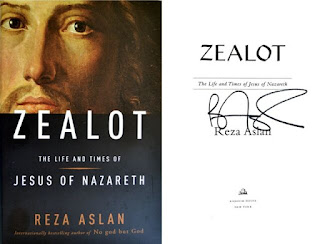Aslan's Zealot
 |
| An Autographed Copy of Reza Aslan's Book "Zealot: The Life and Times of Jesus of Nazareth" |
A Book Review by Bp. Joseph Boyd (Ancient Church of the West)
Is there a difference between the Christ of Faith and the Christ of History? To Aslan, "Faith" finds its way from a human desire to know, control and communicate the Ultimate, resulting in the deification of a man who conformed to the apocalyptic and rabbinic cultural expectations of his day. This process of deification and mediation allows for the later development of Christian doctrine and the deification of those not "born divine". This message was later used by Paul as a powerful source of mythos to convert Gentile slaves to a form of pseudo-Judaism, and forms the basis on which a malleable, cultural identity forms around the appearance of Christ the man. "History" is that which forms a contrast to faith, in that it is an unbiased, objective and disinterested study of historical cause and effect, logically leading to the observable world of today.
Aslan fails to point out the ideological commitments of the "Historical Jesus Movement" and of German Higher Criticism as a whole, which has grown up as a reaction against the abuse of religion in specifically religious communities, not in the context of objectivity and an unbiased perspective. This "Historical View" was created as a weapon specifically against Christianity, and under its laser-like focus, no religious system stands muster. However, Aslan does not apply the same exacting criterion to the context of Islam. Many have, such as Cristoph Luxenberg's "Syro-Aramaic Reading of the Koran", and other scholars have critiqued the linguistic, historical, political, military and cultural perspective of Islam, but they have failed to gain an audience because Muslims do not allow criticism of their faith or think logically about the historical or cultural context of their "revelation", reacting in extreme violence to destroy any mention of their own inner contradiction (as they did with Salman Rushdie's "Satanic Verses"). These fail even a cursory mention, which, if the techniques of Criticism were indeed infallible and universal, should be applied across the board, collapsing Islam as well into the true darkness of nihilistic and culturally masochistic atheism.
Regardless, Aslan is right about many things, and especially how the organization of the Church effectively decided who Christ was, and then politically persecuted and excluded all disagreeing views. "Orthodoxy" is a cultural and political construct, but Aslan fails to show that it is a bad thing, or that it Orthodoxy fails to provide for human flourishing - The success of Roman Catholicism in arts and sciences, and the flowering of humanistic cultural under Byzantium directly contradicts this mentality. His understanding of the cultural deification of Christ leading to the philosophical deification of man fails to make the next step and show the logical connection to the deification of culture. Culture deified is not a bad thing - it allows for the highest human values and intellectual gifts to be expressed in a way that does not tear down the individual (reducing him to a mere animal) or destroy the traditional family (by undermining morality and the necessity of social covenants, sexual mores and relational restrictions). This is why Christianity has not, at least until the advent of Protestantism, created a "Tabula Rasa" approach that destroys all antecedent culture - it transforms and reconfigured, but its basic motivation has been preservation. Islam has wiped out that which preceded it, but the Church has folded it into itself, like the yeast that Christ said the Kingdom was really like, leavening the world with the Life of the Spirit!
Aslan's great dishonesty is in unfairly analyzing his own social and political motivations, the Atheist-Secular-Islamic tag team that is working to dethrone and destroy Christianity in the West, and then tying in an apologetic to the "Logic of Islam" without acknowledging the violence, persecution and exclusion innate in its approach. This contradiction is unforgivable, showing an underlying desire to manipulate and pander, even though it's obviously only being used rhetorically! Uninformed individuals think that his approach reflects reality, but it actually fails to illuminate history and/or elucidate a hermeneutic that is not self-contradictory, relying on a likable American presentation and an unstated tie-in to the new philosophy of deification, evolutionary secularism, our new "Orthodoxy".
As the Confucians say, "The smile hides a sword"!


Comments
Post a Comment